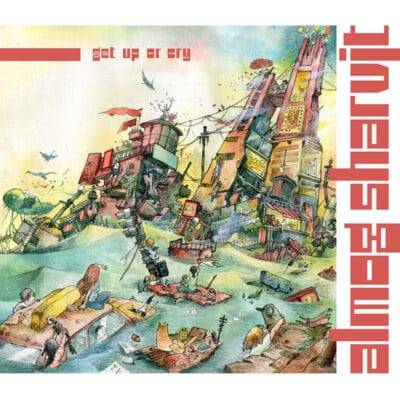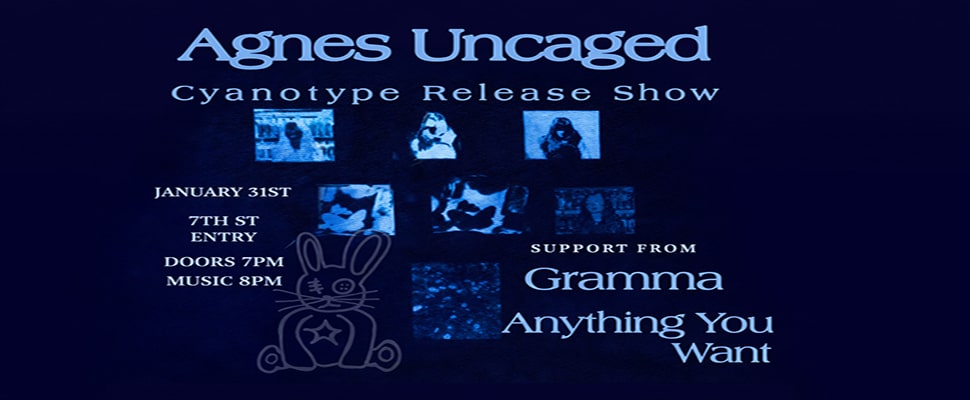Almog Sharvit Get Up or Cry
 Almog Sharvit
Get Up or Cry
Unit
Get Up or Cry is the first album as a leader for New York-based bassist and composer Almog Sharvit. Yet this is far from your conventional jazz record; some of the press materials bill it as a crossover record. Much of that has to do with Sharvit’s sense of humor although even the rather unusual instrumentation (thinking mostly banjo) provides some slight clues. Aboard are the leader on acoustic and electric bass, Adam O’Farrill (trumpet), Brandon Seabrook (guitar and banjo), Micha Gilad (piano, keys, and synths), and Lukas König (drums). Typifying Sharvit’s sense of humor is this comment from the inside jacket- “…is for the roller skaters, job seekers, goofy neighbors, disco dancers, sleep walkers, dream chasers, and people who insist on leaving voicemails.”
Before proceeding though, there are guest contributors on select tracks including Ambrose Getz, the vocalist on the title track, David Leon, flute on “Mx. Bean,” Idan Morim, acoustic guitar on “Dear Hunter” and a chorus of voices on “We’ll Get Back to You.” The album both pushes and blurs boundaries. Jazz is often at the center but flourishes of electronic music, psychedelic rock, bluegrass, 20th century classical, and maybe even other forms that this writer isn’t hearing make their way into his mix. The sound is also a product of the process. The basic tracks were recorded in s single day (it is short as there are only six comprising less than 30 minutes). In post-production Sharvit applied experimental techniques such as filter sweeps, heavy distortion and compression, and creative automation and panning that he claims will “knock the dust off your stereo).
He begins with the free flowing, banjo-driven, trumpet laced “Dear Hunter” which creates a fun, danceable vibe with hints of Dixieland (yes, there was another genre in here too). Sharvit takes a lyrical acoustic bass solo and the band converses with König on the eights in classic jazz structure. “Roller Disco” aptly has an electric bass and plenty of electronic effects, making even O’Farrill’s trumpet sound blurry (or dizzy). “Mx Bean,” the longest track at six and half minutes, sound nothing like the first two but more like an extension of 20th century classical until the melody takes shape, sounding familiar somehow, followed by an inventive Gilad piano excursion a brief flute solo from guest Leon.
At times “We’ll Get Back to You,” his humorous ode to those who insist on leaving voicemails, seems like the soundtrack to a cartoon, bouncing all over the place unpredictably. Clearly, he and the band were having too much fun. The title track’s lyrics are from “A Poem” from INSOMNIAC DREAMS by Vladimir Nabokov, with Ambrose Getz singing to an aptly ethereal backdrop. The closer “Open Wound,” unlike the joyous vibe of the other, begins as a requiem and evolves into a more melodic piece mostly via Gila’s work on the synths and keys. Throughout Sharvit makes a concerted effort to address an array of emotions. He composed, arranged and produced all tracks, doing an enviable job of cramming so many different styles into one effort that’s memorable for the many explorations he makes.
Jim Hynes
Almog Sharvit
Get Up or Cry
Unit
Get Up or Cry is the first album as a leader for New York-based bassist and composer Almog Sharvit. Yet this is far from your conventional jazz record; some of the press materials bill it as a crossover record. Much of that has to do with Sharvit’s sense of humor although even the rather unusual instrumentation (thinking mostly banjo) provides some slight clues. Aboard are the leader on acoustic and electric bass, Adam O’Farrill (trumpet), Brandon Seabrook (guitar and banjo), Micha Gilad (piano, keys, and synths), and Lukas König (drums). Typifying Sharvit’s sense of humor is this comment from the inside jacket- “…is for the roller skaters, job seekers, goofy neighbors, disco dancers, sleep walkers, dream chasers, and people who insist on leaving voicemails.”
Before proceeding though, there are guest contributors on select tracks including Ambrose Getz, the vocalist on the title track, David Leon, flute on “Mx. Bean,” Idan Morim, acoustic guitar on “Dear Hunter” and a chorus of voices on “We’ll Get Back to You.” The album both pushes and blurs boundaries. Jazz is often at the center but flourishes of electronic music, psychedelic rock, bluegrass, 20th century classical, and maybe even other forms that this writer isn’t hearing make their way into his mix. The sound is also a product of the process. The basic tracks were recorded in s single day (it is short as there are only six comprising less than 30 minutes). In post-production Sharvit applied experimental techniques such as filter sweeps, heavy distortion and compression, and creative automation and panning that he claims will “knock the dust off your stereo).
He begins with the free flowing, banjo-driven, trumpet laced “Dear Hunter” which creates a fun, danceable vibe with hints of Dixieland (yes, there was another genre in here too). Sharvit takes a lyrical acoustic bass solo and the band converses with König on the eights in classic jazz structure. “Roller Disco” aptly has an electric bass and plenty of electronic effects, making even O’Farrill’s trumpet sound blurry (or dizzy). “Mx Bean,” the longest track at six and half minutes, sound nothing like the first two but more like an extension of 20th century classical until the melody takes shape, sounding familiar somehow, followed by an inventive Gilad piano excursion a brief flute solo from guest Leon.
At times “We’ll Get Back to You,” his humorous ode to those who insist on leaving voicemails, seems like the soundtrack to a cartoon, bouncing all over the place unpredictably. Clearly, he and the band were having too much fun. The title track’s lyrics are from “A Poem” from INSOMNIAC DREAMS by Vladimir Nabokov, with Ambrose Getz singing to an aptly ethereal backdrop. The closer “Open Wound,” unlike the joyous vibe of the other, begins as a requiem and evolves into a more melodic piece mostly via Gila’s work on the synths and keys. Throughout Sharvit makes a concerted effort to address an array of emotions. He composed, arranged and produced all tracks, doing an enviable job of cramming so many different styles into one effort that’s memorable for the many explorations he makes.
Jim Hynes
Discover more from Making A Scene!
Subscribe to get the latest posts sent to your email.







